
The Pterygota are a subclass of insects that includes all winged insects and the orders that are secondarily wingless.
The order Embioptera, commonly known as webspinners or footspinners, are a small group of mostly tropical and subtropical insects, classified under the subclass Pterygota. The order has also been called Embiodea or Embiidina. More than 400 species in 11 families have been described, the oldest known fossils of the group being from the mid-Jurassic. Species are very similar in appearance, having long, flexible bodies, short legs, and only males having wings.

An entomopathogenic fungus is a fungus that can kill or seriously disable insects.

The superfamily Chrysidoidea is a very large cosmopolitan group, all of which are parasitoids or cleptoparasites of other insects. There are three large, common families and four small, rare families. Most species are small, almost never exceeding 15 mm. This superfamily is traditionally considered to be the basal taxon within the Aculeata, and, as such, some species can sting, though the venom is harmless to humans.
Tarsali is a census town in Vadodara district in the Indian state of Gujarat.

The Western equine encephalomyelitis virus is the causative agent of relatively uncommon viral disease Western equine encephalomyelitis (WEE). An alphavirus of the family Togaviridae, the WEE virus is an arbovirus transmitted by mosquitoes of the genera Culex and Culiseta. WEE is a recombinant virus between two other alphaviruses, an ancestral Sindbis virus-like virus, and an ancestral Eastern equine encephalitis virus-like virus. There have been under 700 confirmed cases in the U.S. since 1964. This virus contains an envelope that is made up of glycoproteins and nucleic acids. The virus is transmitted to people and horses by bites from infected mosquitoes and birds during wet, summer months.
Irenomys tarsalis, also known as the Chilean climbing mouse, Chilean tree mouse, or long-footed irenomys, is a rodent found in Chile, from about 36° to 46°S, and in adjacent Argentina, mainly in forests. It is a large, long-tailed, soft-furred mouse characterized by grooved upper incisors and specialized molars with transverse ridges, divided by deep valleys, which are connected by a transverse ridge along the midline of the molars.

MRC II Distribution Company L.P., doing business as MRC, is an American film and television studio. Founded by Mordecai (Modi) Wiczyk and Asif Satchu, the company funds and produces film and television programming.
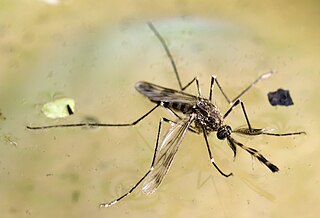
Culex tarsalis, also known as Western Encephalitis Mosquito, is a mosquito species that appears in southern California. The species has black and white banding on the legs.
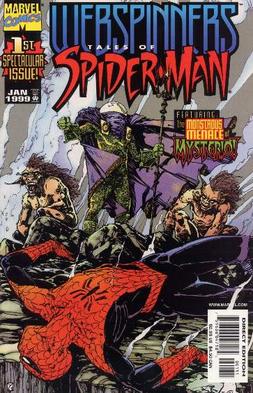
Webspinners: Tales of Spider-Man is a comic book series starring Spider-Man published by Marvel Comics for 18 issues from January 1999 to June 2000.
Hart Park virus, or HP virus, is a single-stranded RNA arbovirus that is primarily transmitted through mosquitoes. The HP virus is classified in the Rhabdoviridae family and is related to the viral agents that cause rabies and vesicular stomatitis. The exact date of discovery of this virus is uncertain, but its presence in the entomological community dates back as far as 1964. Because of its relatively recent discovery, its exact effect on hosts is uncertain. Currently, there is no known disease affiliated with the Hart Park virus.
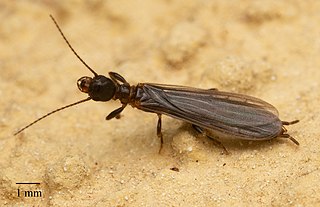
Oligotoma nigra, also known as the black webspinner, is a species of insect in the order Embiidina, also known as Embioptera.
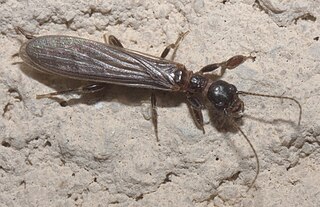
Oligotoma is a genus of webspinners, insects in the order Embioptera, also known as Embiidina. The type species is Oligotoma saundersii and the type locality the Indian subcontinent. The males have wings but the females are flightless. Embiids are recognisable by the enlarged front tarsi, which contain a large number of silk glands that they use to spin the threads they use for building the tubes and galleries in which they live.

Haploembia solieri or bicolored webspinner is a species of webspinner in the family Oligotomidae. It is found in Europe, Northern Asia, and North America. Unlike Haploembia tarsalis, which reproduces asexually, H. solieri reproduces sexually. Adult specimens of H. solieri are orange and black and around 11 mm long.

Haploembia is a genus of webspinners in the family Oligotomidae. There are at least three described species in Haploembia. They are native to the Mediterranean, but have been observed in the Western united states, and are adventive elsewhere.
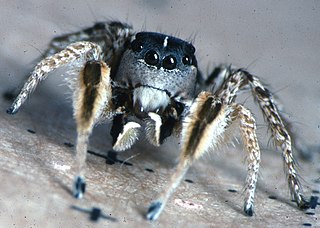
Habronattus tarsalis is a species of jumping spider in the family Salticidae. It is found in the United States and has been introduced into Hawaii.
Aposthonia ceylonica is a species of webspinner of the family Oligotomidae native to tropical Asia, Madagascar and Mauritius. In February 2019, a colony of this insect was identified in a greenhouse at the RHS Garden, Wisley, Surrey, England, on the roots of an orchid. It was thought that the insects had been accidentally introduced on plants imported from Thailand.
Rhagadochir virgo is a species of webspinner, an insect in the order Embiidina, also known as Embioptera. This species is native to the Republic of the Congo in tropical West Africa.
Sister Monica Asman (1920-2016) was an American Catholic nun and research scientist at University of California, Berkeley. She applied genetic methods to mosquitoes with the aim of reducing their ability to carry viruses that can cause disease in humans and animals, and to reduce the size of mosquito populations. She also opened the St. Francis Center of Redwood City for the poor.










